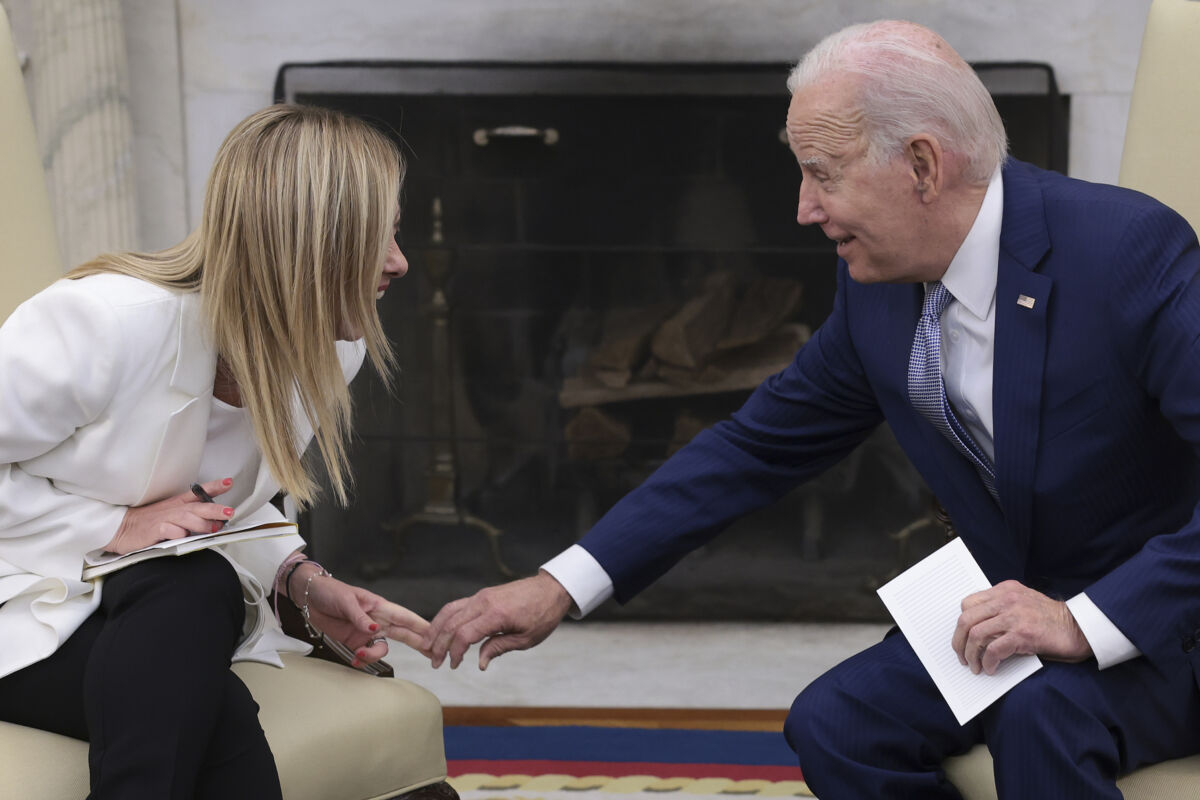President Joe Biden welcomed Italy’s Prime Minister Giorgia Meloni to the White House on July 27, the first time since the conservative leader assumed office last fall.
“We’ve become friends,” Mr. Biden said during the bilateral meeting, praising Ms. Meloni for her strong support and defense against “Russian atrocities.”
The president then thanked the Italian people for their support of Ukraine.
“I want to thank them for supporting you in supporting Ukraine. It makes a big difference,” Mr. Biden remarked. “As NATO allies, the Transatlantic Partnership is a cornerstone of our shared security. And the Italian troops are playing a critical role in Europe, the Mediterranean, and beyond.”
The leftist media, however, have questioned the White House’s decision to invite Ms. Meloni after the president publicly criticized her “far-right” views and warned of the rise of authoritarianism around the world following her election.
“You just saw what’s happened in Italy in that election,” Mr. Biden said of the Italian election last year. “You’re seeing what’s happening around the world. And the reason I bother to say that is, we can’t be sanguine about what’s happening here, either.”
During the press conference on July 26, reporters pressed the White House about whether the president’s view of Ms. Meloni has changed.
“He has a good relationship with Prime Minister Meloni, and he has enjoyed working with her,” said John Kirby, a spokesman for the National Security Council. “They get along quite well, particularly on issues of foreign policy. And again, the President is looking forward to this visit.”
The president noted that Italy will be hosting next year’s Group of Seven (G7) summit.
“I hope you’ll be nice to me as the chairman,” Mr. Biden joked during the meeting.
Ms. Meloni thanked Mr. Biden for his “hospitality.”
She said that Western nations have demonstrated that they can rely on one another far more than many assumed.
According to the White House, both leaders met to reaffirm the strong bilateral relationship and discuss shared challenges such as China, Russia’s war in Ukraine, developments in North Africa, and climate change.
“The President has been looking forward to this visit quite a bit,” Kirby told reporters on July 26. “The United States and Italy are close NATO Allies and G7 partners. We’re important trade partners. And there are very strong bonds between our two peoples.”
He went on to praise Italy’s military, economic, and humanitarian assistance to Ukraine.
Since Ms. Meloni assumed office last year, the two leaders have met multiple times, including at the G20 Summit in Bali, the G7 Summit in Hiroshima, and the NATO Summit in Vilnius.

Ms. Meloni is described in the liberal media as the “first far-right nationalist” to lead Italy since Benito Mussolini. She has been criticized for her domestic policies, including tough stances on migration, LGBT rights, and “woke ideology,” and is seen as closely aligned with Hungary’s Prime Minister Viktor Orban. A recent New York Times article called Ms. Meloni “an Italian version” of former President Donald Trump, who addressed the Conservative Political Action Conference (CPAC) in the United States last year.
Italy to Exit Belt and Road
In March 2019, Italy signed a memorandum of understanding with China on the Belt and Road Initiative, becoming the first major European economy to join the controversial infrastructure project.
Ms. Meloni has been an outspoken supporter of democratic values and a critic of China’s human rights violations. She has recently hinted that Italy may soon withdraw from the Belt and Road Initiative (BRI).
It is unclear whether Washington had any influence on this decision. Kirby declined to comment on Ms. Meloni’s announcement, noting that it is “their sovereign decision.”
“But it’s becoming increasingly obvious,” he added, “that more and more countries around the world are seeing the risks and, quite frankly, the lack of reward for economic partnerships with China.”
BRI, the Chinese Communist Party’s (CCP) multibillion-dollar global infrastructure development initiative, has long been criticized for burdening host nations with debt, neglecting local environmental impacts, and exporting Chinese labor rather than creating local jobs. Experts often refer to BRI as “debt-trap diplomacy” since the CCP confiscates assets when countries fail to repay loans, hence expanding China’s strategic and military reach.
Last year, the G7 countries proposed a new infrastructure investment program for developing countries to compete with China’s BRI. According to Kirby, the program, known as the Partnership for Global Infrastructure and Investment (PGII), is a good alternative to the BRI.
“That is a good alternative, and it is getting some traction. And so, we’re going to continue to invest in that and continue to encourage our partners to as well,” Kirby said.
So far, Italy is the only G7 country that has joined China’s infrastructure program, with critics claiming that the agreement will allow Beijing to seize control of sensitive technologies and essential infrastructure.
According to Derek Scissors, a senior fellow at the American Enterprise Institute (AEI) and China expert, Italy’s decision to exit the BRI is not really what matters.
“Italy can accept or reject any Chinese projects it wants, whether it’s in the BRI or not,” he told The Epoch Times.
He noted, however, that Italy’s decision demonstrates that the European country has changed its view about China due to rigorous zero-COVID measures and the communist regime’s leadership.
“It means that Italy has become more skeptical of Chinese investments,” Scissors said. “That change is what matters.”
From The Epoch Times

